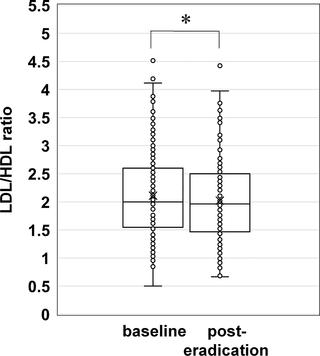PLOS ONE ( IF 2.9 ) Pub Date : 2019-08-16 , DOI: 10.1371/journal.pone.0221349 Naoto Iwai , Takashi Okuda , Kohei Oka , Tasuku Hara , Yutaka Inada , Toshifumi Tsuji , Toshiyuki Komaki , Ken Inoue , Osamu Dohi , Hideyuki Konishi , Yuji Naito , Yoshito Itoh , Keizo Kagawa

|
Background
Extra-gastric manifestation of Helicobacter pylori infection involves systemic inflammation, which results in the production of several cytokines. Only a few clinical trials have investigated the effect of H. pylori eradication therapy on lipid metabolism in the infected patients with chronic gastritis. We aimed to evaluate the effect of H. pylori eradication therapy on lipid metabolism in a Japanese population with chronic gastritis.
Methods
One hundred and sixty-three patients with H. pylori-associated chronic gastritis were enrolled in this study between June 2015 and March 2017. They underwent H. pylori eradication therapy; the effects of the therapy were assessed by the urea breath test performed at least 4 weeks after the therapy. After confirming H. pylori eradication, the health screening examination was repeated between May 2016 and August 2018. The clinical parameters were compared before and after the administration of the eradication therapy.
Results
The mean age of the enrolled patients was 56.7 years, and the mean follow-up duration was 514.7 days. Weight, body mass index, and obesity index were significantly increased post-eradication therapy compared to those pre-eradication therapy. White blood cell and platelet counts were significantly decreased, and high density lipoprotein cholesterol (HDL) level was significantly increased (P = 0.001), while low density lipoprotein cholesterol (LDL), total cholesterol, and triglycerides levels were not altered significantly. Hence, the LDL/HDL ratio was significantly decreased.
Conclusions
This study reported that H. pylori eradication therapy increase the HDL levels in the infected patients with chronic gastritis. Hence, the LDL/HDL ratio, which is used to evaluate the risk of atherosclerosis, was significantly decreased post-eradication therapy compared to that pre-eradication therapy.
中文翻译:

根除幽门螺杆菌可增加慢性胃炎感染患者血清高密度脂蛋白胆固醇水平:一项单中心观察性研究
背景
幽门螺杆菌感染的胃外表现涉及全身性炎症,其导致多种细胞因子的产生。只有少数临床试验研究了H的作用。幽门螺杆菌根除疗法对慢性胃炎感染患者脂质代谢的影响。我们旨在评估H的作用。幽门螺杆菌根除疗法对日本慢性胃炎人群脂质代谢的影响。
方法
163例H型患者。幽门螺旋杆菌-相关的慢性胃炎在本研究中2015年6月和2017年三月之间他们经历了招收^ h。幽门螺杆菌根除疗法;在治疗后至少4周通过尿素呼气试验评估治疗效果。确认H之后。根除幽门螺杆菌后,于2016年5月至2018年8月重复进行健康筛查检查。比较了根除治疗前后的临床参数。
结果
入组患者的平均年龄为56.7岁,平均随访时间为514.7天。与根除治疗相比,根除治疗后体重,体重指数和肥胖指数显着增加。白细胞和血小板计数显着降低,高密度脂蛋白胆固醇(HDL)水平显着增加(P = 0.001 ),而低密度脂蛋白胆固醇(LDL),总胆固醇和甘油三酸酯水平没有明显改变。因此,LDL / HDL比率显着降低。
结论
该研究报告称,^ h。幽门螺杆菌根除疗法可提高感染的慢性胃炎患者的HDL水平。因此,与根除前的治疗相比,根除后的治疗显着降低了用于评估动脉粥样硬化风险的LDL / HDL比。







































 京公网安备 11010802027423号
京公网安备 11010802027423号